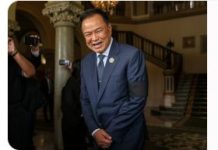ISLAMABAD: OCT 29 (DNA): In a high-level roundtable discussion conducted by the Institute of Regional Studies (IRS), Islamabad, the Iranian Ambassador to Pakistan, Dr Reza Amiri Moghaddam, reiterated Iran’s willingness to an open and constructive diplomacy on nuclear issue. Amb Amiri denounced the aggressive posture of the US and labelled it as a clear violation of international law and UN norms.
He further elaborated that re-imposition of sanctions were politically motivated which undermined the credibility of international agreements. Criticizing the UNSC, Amb Amiri denounced the forum for failing to prevent unilateral actions and overlooking Iran’s verified compliance record.
He clarified that under Article 26 of the JCPOA, Iran retained the right to respond proportionally to violations by other signatories. Despite this, he once again emphasized that Iran’s nuclear program was entirely peaceful and consistent with the postulates of the NPT. Amb Amiri also appreciated Pakistan’s consistent support and highlighted the need for stronger cooperation in energy, trade and connectivity projects.
In his keynote address, Amb Khalid Mahmood, former envoy to Iran, provided a strategic assessment of the snapback sanctions and their broader implications for global non-proliferation norms. He observed that the JCPOA (2015), once hailed as a model of cooperative diplomacy, collapsed due to unilateral actions and the breakdown of trust. Amb Mahmood explained that the Cairo understanding was an attempt to reestablish limited monitoring and inspection under the UN framework, but the triggering of snapback mechanism undermined its progress.
He warned that sanctions might insinuate further instability through their secondary effects on regional states like Syria, Yemen and Lebanon.
Amb Jauhar Saleem highlighted that Pakistan’s relationship with Iran stood the test of time and that recent 12-day conflict between Iran and Israel demonstrated its significance. He mentioned that the failure of JCPOA eroded the trust in global commitments and disproportionately impacted the ordinary citizens.
Amb Jauhar noted that sanctions disrupted South Asian trade flows, approximately 70–80 percent of which was dependent on maritime routes. He Stressed that Pakistan always advocated for a balanced and cooperative approach that avoided zero-sum rivalries and promoted inclusive regional growth through the platforms like CPEC and BRI.
Professor, faculty of World studies University of Tehran Dr Tohid Asadi analyzed that the sanctions obstructed Iran’s access to global markets, technology and capital, and affected the regional supply chains and energy routes. Dr Asadi was of the view that Tehran’s foreign policy now prioritizes geo-economic integration with regional partners in which Pakistan holds the special place.
He stressed that Tehran–Islamabad relationship is now evolving beyond security concerns to include connectivity, trade corridors and energy collaboration.

















